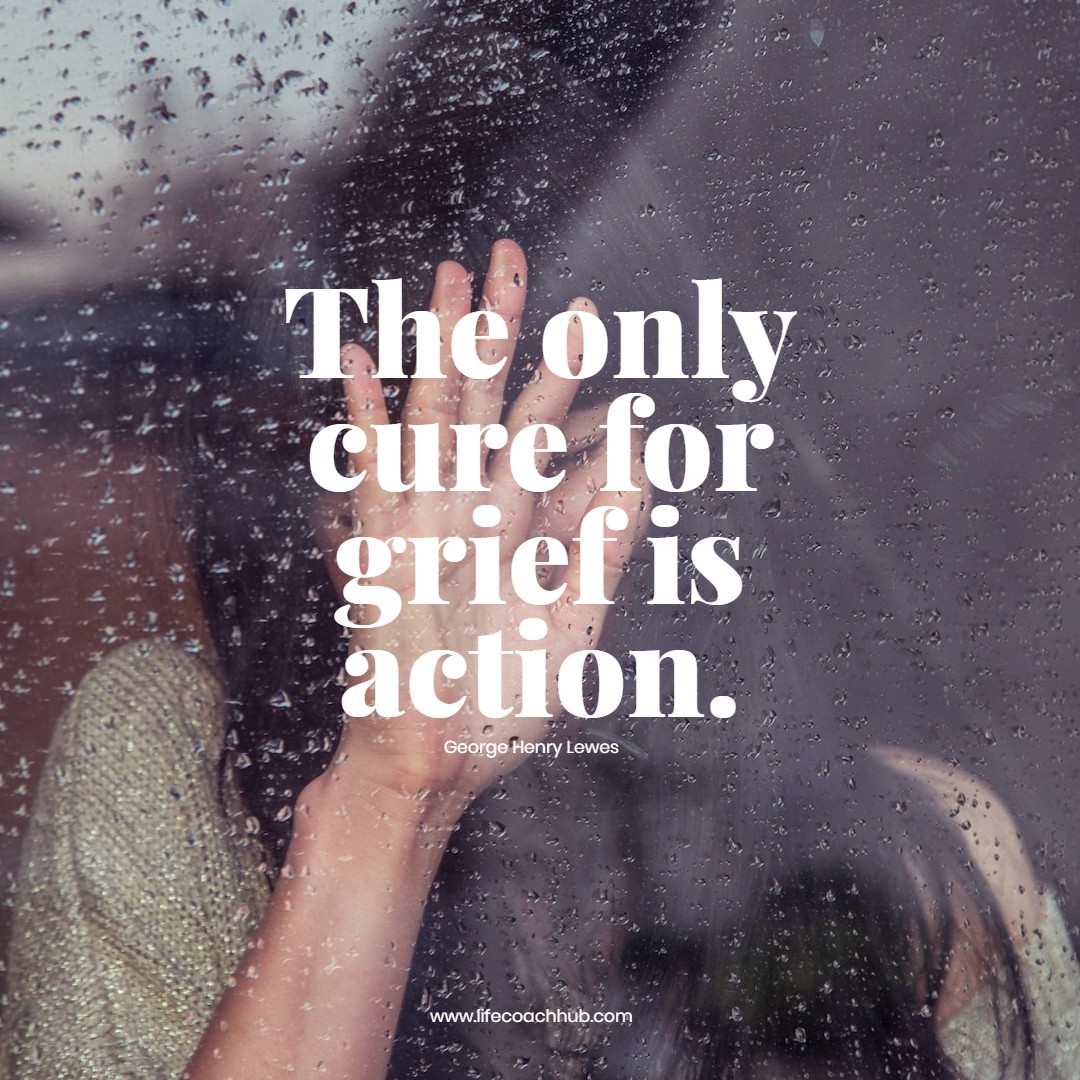Grief coaches play a distinctive role in aiding individuals through their grief journeys. They're not therapists. Yet their specialized training and hands-on experience equip them to provide valuable support during times of loss and bereavement. These compassionate experts are equipped with the knowledge and skills to assist people who are in mourning. Especially their clients who are accompanied by the passing of a loved one, the conclusion of a significant relationship, or other substantial losses.
Grief is that natural and complex emotional reaction that we humans have towards a significant loss. It's not a singular emotion, no. It's a blend of various feelings. There's the obvious sadness. Then, the anger, guilt, confusion, and sometimes, even relief.
When we talk about grief, it isn't just because of the death of a loved one. It can also stem from numerous other losses. May that be the end of a relationship, the loss of a job, a pet's death, or a major life change like your retirement.
Each person's grief journey is unique to them and their circumstances. Their individual experiences, beliefs, and coping mechanisms influence it greatly.
While grief doesn't follow a fixed roadmap, it has a model that identifies five stages (Kübler-Ross, 2014).Denial. Anger. Bargaining. Depression. Acceptance.
It's not always in that order, as these stages can be cyclical. Not everyone experiences each one or goes through them in a specific order. Understanding these stages can provide some clarity during a tumultuous time.
And this is something that a grief coach is highly equipped to help you with. They can guide you through each stage and pave the way toward healing.
This stage in the grieving process may just be the most challenging one you'll navigate. It's when you find it hard to accept the reality of your loss. Denial is a defense mechanism. A way your mind shields you from the shock and pain of loss.
During this stage, you might feel numb or in a daze. You may have thoughts like, "This can't be happening," or "They'll come back, surely." plaguing you.
A grief coach provides a safe and non-judgmental space for you to express these feelings. They understand that denial is a natural part of grief. Rushing you through it will only be counterproductive. What they'll do instead is guide you in acknowledging your emotions. They will gently help you confront the reality of your loss.
Through compassionate listening and empathetic support, your coach encourages you to accept the truth gradually.
Another stage that you're probably too familiar with is anger. It's recognizable by intense feelings of frustration, irritation, and rage. It's a fair reaction to the overwhelming sense of loss and powerlessness you found yourself unexpectedly in. During this stage, you might feel anger toward the person you've lost. It can be at yourself for not preventing the loss. Or at the world for being cruel.
First and foremost, a grief coach provides validation for your feelings. This reassurance from a third party can reduce some of the guilt or confusion fueling your anger.
They allow you to express your anger in a non-judgemental space. This involves talking, journaling, or engaging in physical activities. Basically, anything that will enable you to release pent-up energy and frustration.
Your coach will help you identify the specific triggers for your anger. Knowing the underlying causes is crucial. And understanding them will help you better address them. As an example, your anger might be rooted in abandonment. You can then explore this during your coaching sessions.
There's the guilt. Then, there's the desire to make deals in hopes of reversing or preventing the loss. This is what the bargaining stage is about.
Often, there are "what-if" scenarios lurking about. There might even be a longing for things to return to how they were before the loss occurred.
Guilt is a prevalent emotion in this stage. A grief coach provides techniques for managing guilt constructively. They help you recognize that you are not responsible for the loss and couldn't have prevented it.
Together, you can explore the "what if" scenarios that often play out in your mind. This can be a therapeutic process all in all. You get to acknowledge your desires and regrets while also recognizing their impossibility.
Furthermore, bargaining often involves unrealistic goals or attempts to negotiate with fate. A grief coach assists you in setting more realistic and achievable goals.
A grief coach encourages self-compassion during this stage. They help you practice self-forgiveness and understanding. This way, you accept that you're doing your best to cope with a difficult situation.
During the fourth stage, you may face deep sadness, a sense of emptiness, and a profound longing for what has been lost. During this phase, you may withdraw from social activities. Not to mention, you'll experience changes in appetite or sleep patterns. Even have the difficulty finding joy in life.
Grief coaching emphasizes the importance of self-care during the depression stage. A grief coach helps you develop self-care routines that prioritize your physical and emotional well-being. This will include exercise, proper nutrition, and relaxation techniques.
On a related note, depression often involves negative thought patterns. A coach assists you in recognizing and challenging these thoughts. They teach you cognitive-behavioral strategies to reframe negative thinking. Depression can sometimes lead to bottling up emotions, after all.
Keep in mind that healing from depression takes time. A coach reminds you that setbacks are okay and that the journey toward recovery is not linear.
The ultimate goal of grief coaching is to help you move toward acceptance. While depression may persist, acceptance involves finding ways to live with the loss. It's about finding meaning and joy in life again.
During this stage, you begin to come to terms with your loss. There's the new reality of life without your loved one. A gradual reduction in the intensity of emotional pain transpires. You experience a growing sense of peace and closure from it.
Moreover, a grief coach acknowledges and reinforces the progress made in the grief journey. They recognize that acceptance is not a linear process. You still get to celebrate even the smallest steps forward.
One of the central tasks of the acceptance stage is adjusting to a life without the person or thing. A grief coach helps you understand that it's okay to move forward. You can create a "new normal" that reflects your changed circumstances.
During acceptance, you find ways to remember and honor the loss. All the while, without being overwhelmed by grief. A grief coach assists you in reframing painful memories to sources of comfort and celebration.
We, humans, need justifications. Explanations behind why a particular event happens. We can't just continue on with our lives without knowing. That's why we make theories.
They give us some semblance of understanding. But, often, they are generalizations.
Generalizations that exactly don't apply to our specific situation. Reasons why people become too hard on themselves. An advice that everybody agreed on seemingly didn't work for them. This results in condemning the world as to why they can't move on from the loss they are experiencing.
"I did everything that book/ article recommended."
"Why is it that I'm still feeling this way? Shouldn't I have moved on from my loss already?"
These are just some of the thoughts that might be plaguing you right now.
But let Life Coach Hub assuage you. Grief and loss, like change, are not linear. One day, you're feeling better. Then, the next, you're remembering a memory.
It dampens your mood and puts you back to square one.
You don't have to worry about feeling this way. Having a grief coach can help you through the aftermath of your loss. You'll need one depending on the following factors:
Grief can manifest with varying degrees of intensity. The level of distress experienced can influence the decision to seek professional support.
Mild Grief: Some people experience grief in a milder form. They might feel sadness, occasional bouts of crying, and a sense of loss. Still, they can generally manage daily life without significant disruption.
In such cases, they may not require immediate grief coaching. But support from friends and family can be beneficial.
Moderate Grief: Many people experience moderate grief, with more pronounced emotions. This level of grief may lead to disruptions in daily functioning. Then an increased emotional distress, and difficulty finding joy in life. It often involves periods of sadness, anger, guilt, and yearning for the deceased.
Intense Grief: Intense grief can be overwhelming. You may find yourself unable to carry out routine tasks. It may also be difficult to maintain relationships. Then there's the challenge to concentrate on work or daily responsibilities.
A grief coach can assist you in creating a grief plan. This will outline steps to manage grief over time. It will also cover setting goals for healing, establishing routines, and finding sources of support.
Grief coaches can track an individual's progress and adjust their support accordingly. This is especially crucial when dealing with varying intensities of grief.
Grief is an individualized process. The duration can vary significantly for every individual.
Acute Grief: Acute grief refers to the initial and intense mourning period following a loss. This phase can last for several weeks to a few months. Individuals often experience shock, numbness, and overwhelming emotions during this time.
Integrated Grief: Integrated grief occurs as you gradually adapt to life without the deceased loved one. It is a stage where the intensity of grief begins to wane. And you regain some sense of normalcy. This phase can last anywhere from six months to several years.
Prolonged Grief: Sometimes, grief persists beyond the expected duration. This can lead to prolonged grief or complicated grief. This form of grief can endure for years. And it can disrupt your life.
 United States
$30 -
$7800 USD
Contact me
United States
$30 -
$7800 USD
Contact me
Get unstuck. Get clear. Get going. Get results. I help you get out of your own way.
 United States
$85 -
$175 USD
Contact me
United States
$85 -
$175 USD
Contact me

ONE DAY YOU WILL TELL YOUR STORY OF HOW YOU OVERCAME WHAT YOU WENT THROUGH AND IT WILL BE SOMEONE EL
 India
$3500 -
$10000 USD
Contact me
India
$3500 -
$10000 USD
Contact me
empowering individuals to discover purpose, achieve growth, and make meaningful progress
 United States
from $100 USD
Contact me
United States
from $100 USD
Contact me
Certified in 4 areas: Life Transformation,Trauma,Mayo Clinic Health & Wellness, & USD Life & WorK
 United States
$50 -
$150 USD
Contact me
United States
$50 -
$150 USD
Contact me
I am here to help others understand grief and help to move on from the burden of the heaviness of gr
 United States
$115 -
$350 USD
Contact me
United States
$115 -
$350 USD
Contact me
RESET your life due to or to produce significant change - with support
 United States
$65 -
$525 USD
Contact me
United States
$65 -
$525 USD
Contact me
Guiding your grief and caregiving journey with faith and compassion.

I am a new life coach with excitement and joy in my new position.
 United States
$100 -
$1200 USD
Contact me
United States
$100 -
$1200 USD
Contact me
I help people THRIVE through transitions and create an exciting vision for their future.
 United States
$275 -
$3500 USD
Contact me
United States
$275 -
$3500 USD
Contact me
Here to help you find the inner frredom to love yourself fully and create the life you desire.
 United States
$25 -
$50 USD
Contact me
United States
$25 -
$50 USD
Contact me
As a Certified Grief Coach, I'm passionate about supporting you in your unique journey.
 United States
$60 -
$75 USD
Contact me
United States
$60 -
$75 USD
Contact me
A certified grief coach who will support you through grief, loss and other life transitions


Be the Best YOU! I will guide and coach your deepest desires to transform you into all you desire.
 United States
$75 -
$250 USD
Contact me
United States
$75 -
$250 USD
Contact me

Life Purpose Coach and Certified Yoga Instructor for Mind Body Alignment
 United Kingdom
Contact me
United Kingdom
Contact me
You will never feel alone I will be 100% in your corner helping you gain clarity and positivity
Get matched to an expert coach and book a free consultation.
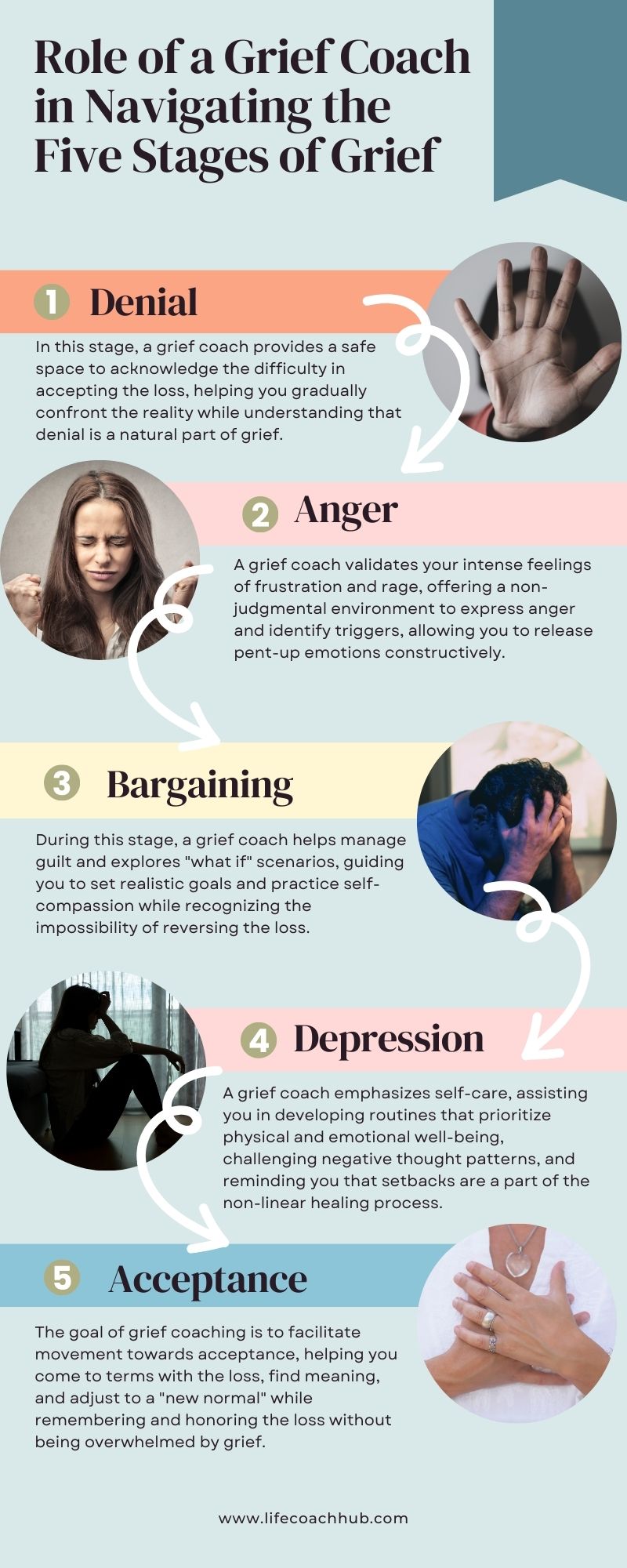
Have you ever encountered someone who doesn't recognize why you're grieving?
Of course, you have. I'll even bet you encounter them far too often than you'd want to.
How frustrating can that be?
There's a name for this, actually. Disenfranchised grief. Grief that isn't recognized as legitimate or reasonable by other people (Gross, 2018).
Talk about invalidating the circumstance you're currently in. Whatever happened to "whatever you're feeling is valid."
In some cases, you may even conceal your grief to avoid ridicule and judgment from others. Pushing those intense feelings down can prove detrimental in the long run.
A grief coach can help you overcome this and a lot more:
A grief coach can assist clients in identifying potential sources of support. This may include friends, family members, or community organizations. Even if these people are not physically present.
In cases where clients have distanced themselves from friends or family due to grief, a grief coach can help facilitate conversations. They can also offer guidance on reconnecting.
Additionally, a grief coach can teach you how to identify and manage grief triggers. Those that can intensify feelings of isolation. They help you develop strategies to cope with these triggers.
A grief coach can also assist you in problem-solving. This might involve exploring ways to create a comforting and supportive environment.
Grief coaches empower clients to face their grief. This way, you can combat isolation, and find a path toward healing and recovery.
A grief coach helps you recognize when you’re stuck in your grief journey. This identification is crucial for seeking extra professional help if and when necessary.
No matter how difficult, telling the story of a loved one's death is an integral part of the grieving process. A grief coach recognizes the therapeutic value of sharing these stories. They understand that this process may take time and that you shouldn't feel rushed.
Your grief coach will also help you recall memories of your loved ones. This can be an excellent way to reconnect with the positive aspects of the relationship. Thus, honoring the person who has passed.
Over time, your coach will work with you to transform the story. From one of pain and loss to one of remembrance and celebration of the person's life.
It may just be that it's not the story surrounding the loss that is difficult to share. But perhaps it's finding the right person you can trust to share it with (Morris, 2017).
Grief can bring chaos and disarray to your life. A grief coach assists you in creating a daily routine that provides stability. This routine includes essential self-care practices. Proper nutrition, exercise, sleep, and mindfulness. Having a structured day helps regain a sense of control and stability.
A grief coach guides you in shifting your perspective. From being stuck in grief to actively working on healing.
They know that not all who grieve heal. Healing requires acknowledging emotional wounds as signals for reassessment. A grief coach encourages you to view these signals as opportunities. You'll reassess your grief work. Including your thoughts about your future without your loved ones (LaGrand, 2011).
There's also the fact that healing doesn't mean forgetting or erasing the memory. Instead, it's about finding a way to carry the memory forward while allowing life to continue. You’ll learn to balance honoring your grief. While also moving forward with your new life circumstances.
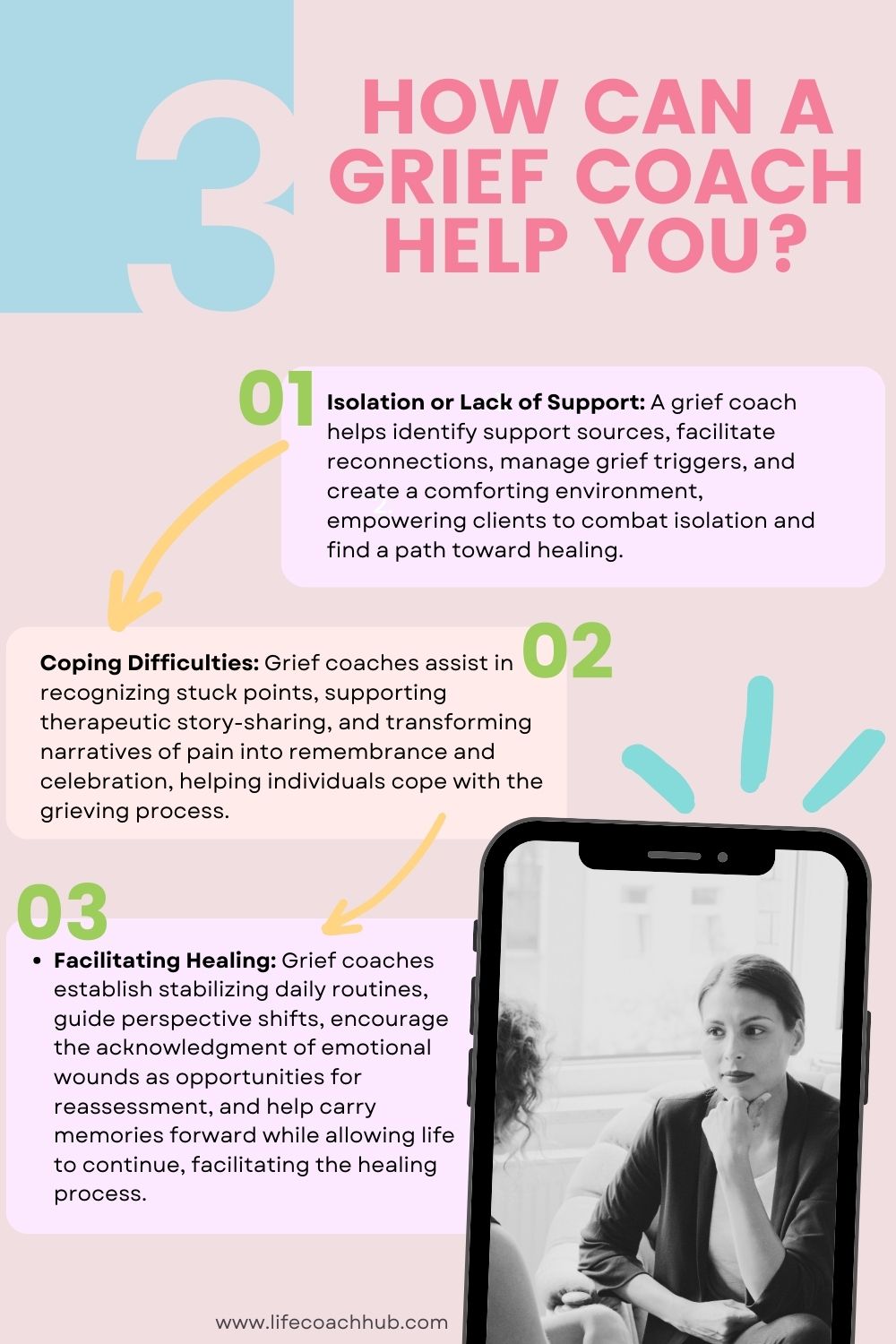
Grief and loss coaching is a specialized form of coaching. It focuses on helping individuals navigate the complexities of loss. And often, it helps in managing overwhelming emotions associated with grief. This type of coaching provides support to help people cope with and heal.
It may be from the death of a loved one, or the end of a significant relationship. Of course it also includes other profound losses, such as the loss of a job, health, or a dream.
Here are the key components of grief and loss coaching:
Emotional Support: Grief coaches offer clients a safe and empathetic space to express their emotions. They provide validation and understanding for loss-related emotions.
Goal Setting: Coaches work with clients to set specific goals for their grief journey. It may be finding ways to manage grief-related stress. Or for you to build resilience.
Practical Strategies: Grief coaches provide strategies for managing grief symptoms and daily life challenges. This includes handling intrusive thoughts, establishing self-care routines, and coping with triggers.
Personalized Guidance: Grief coaches tailor their support to the client's specific needs. This helps you address your challenges during your grieving process.
Creating a New Normal: Part of the coaching process involves helping clients with transitions. Going from the old normal (before the loss) to a new normal. This may include reevaluating your life goals, relationships, and personal values.
Building Resilience. Grief coaching emphasizes developing resilience skills to help clients adapt to life after loss. This includes strategies for you to cope with anniversaries, holidays, and other difficult moments.
Accountability. Coaches help clients stay accountable to their goals and self-care routines. Thus, ensuring that you make steady progress in your healing journey.
It's important to note that grief coaching is not a substitute for therapy or counseling. Most especially, not for complicated grief or traumatic loss cases. Instead, it complements these services.
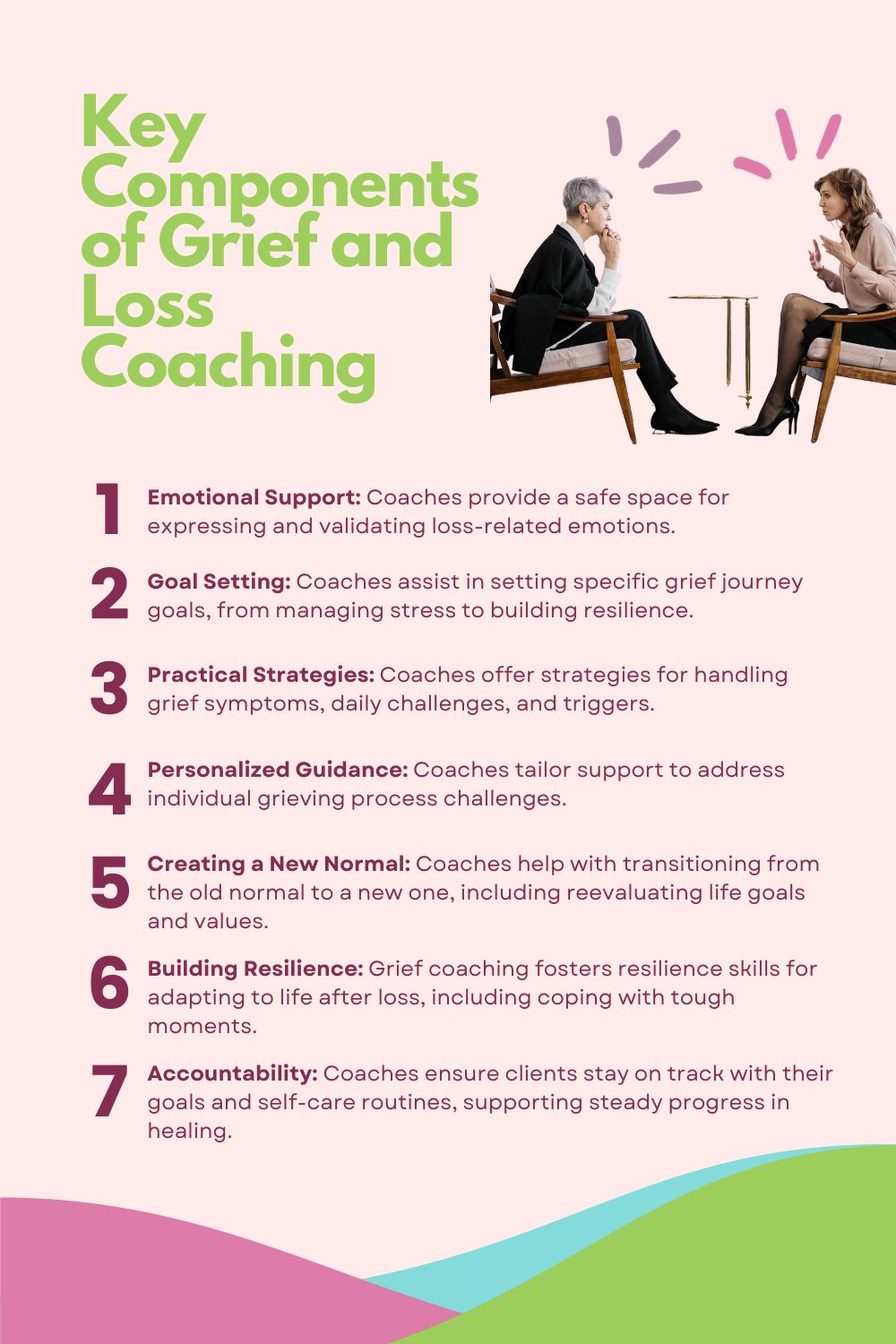
Have you noticed how everyone is sorry after you lose someone? You have probably lost count by now of the number of times you heard the words:
"I'm so sorry for your loss."
It's comforting in the beginning. But it becomes exasperating after a while. What are they even sorry for? It just makes you feel like some pity party. Enough with the sorries. Nothing can reverse what has already happened.
There are even instances when someone will try to console you with these words...
"There are worse things than death."
There is, indeed. Staying behind and dealing with the life robbed of something (Mongelluzzo, 2013). And it doesn't just stop there. For life is filled with more losses that you, time and time again, will experience.
It takes considerable courage. Resilience. And sometimes, a grief coach.
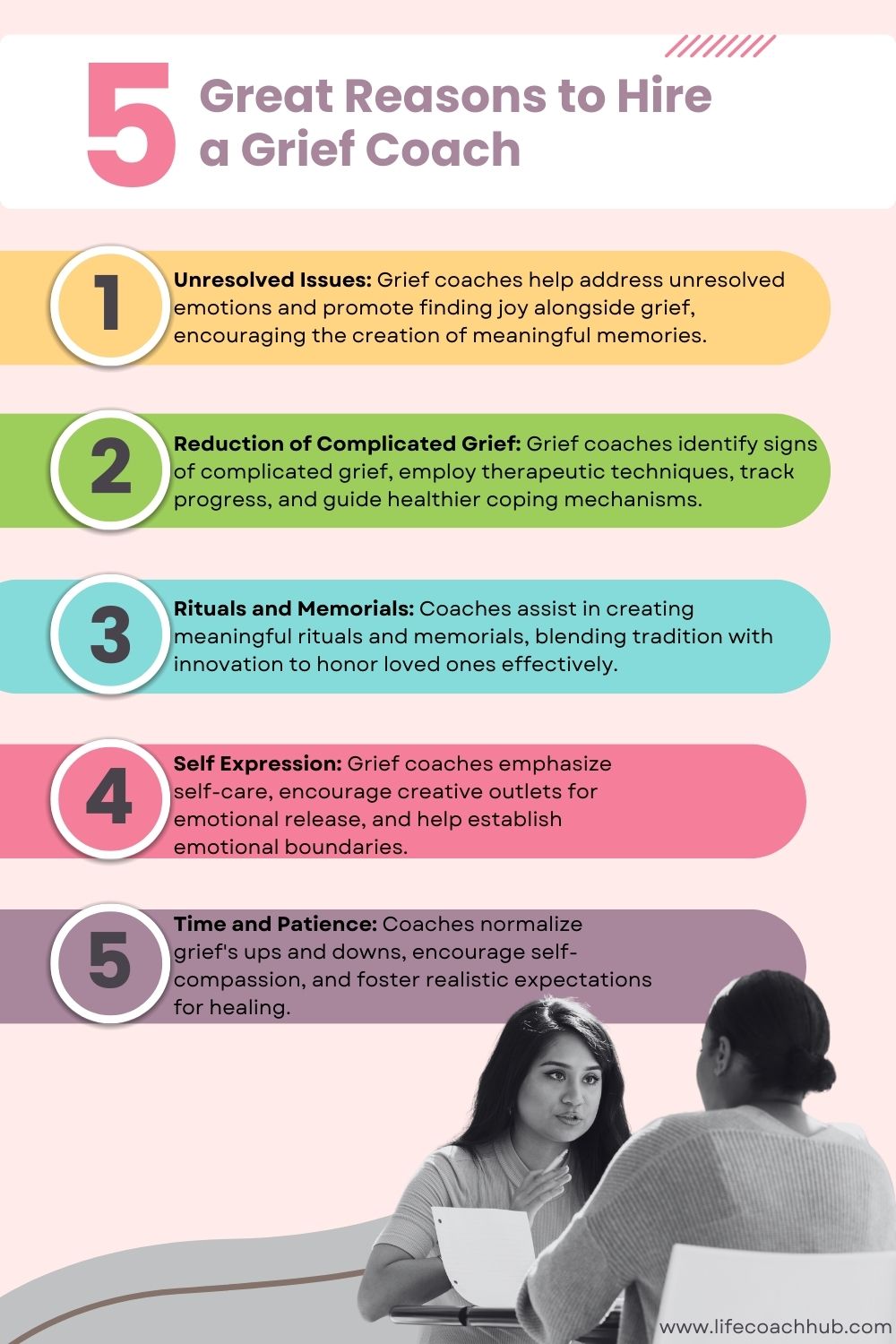
Here are five great reasons why you should hire one:
Grief can be compounded by unresolved issues or emotions related to the loss. These unresolved matters can fester. It hinders the healing process.
A grief coach will help you understand that it's not only acceptable but necessary to find joy in life. Feeling moments of happiness doesn't diminish your love or grief. It's part of the healing process.
Part of the healing involves creating new memories that coexist with your grief. Your coach can help you explore ways to make meaningful experiences. Those that honor your loved one's memory, at the same time, bring joy into your life.
A grief coach recognizes the signs of complicated grief even if it's not as evident to you. With this, they can provide strategies for more manageable and healthier coping.
One way your coach can do this is by using structured therapeutic techniques. These may include cognitive-behavioral approaches, mindfulness practices, or narrative therapy.
As you progress through your coaching sessions, your coach also tracks how far you've come. They observe the variations of your emotional responses. Thus guiding you toward a healthier and more adaptive mourning process.
There's an incredibly healing way that you can engage in after a loss. It's through rituals, memorials, and legacy work. You get to honor and remember your loved one while finding purpose.
A grief coach can guide you in creating something that will hold deep meaning for you. Whether that's a memorial service, creating a memorial garden, or starting a charity in your loved one's name. They'll help make it unique and relevant to your relationship.
A grief coach can also assist you in balancing traditional practices with innovative approaches. This blend can create a meaningful experience. While also acknowledging the changing dynamics of grief in the modern world.
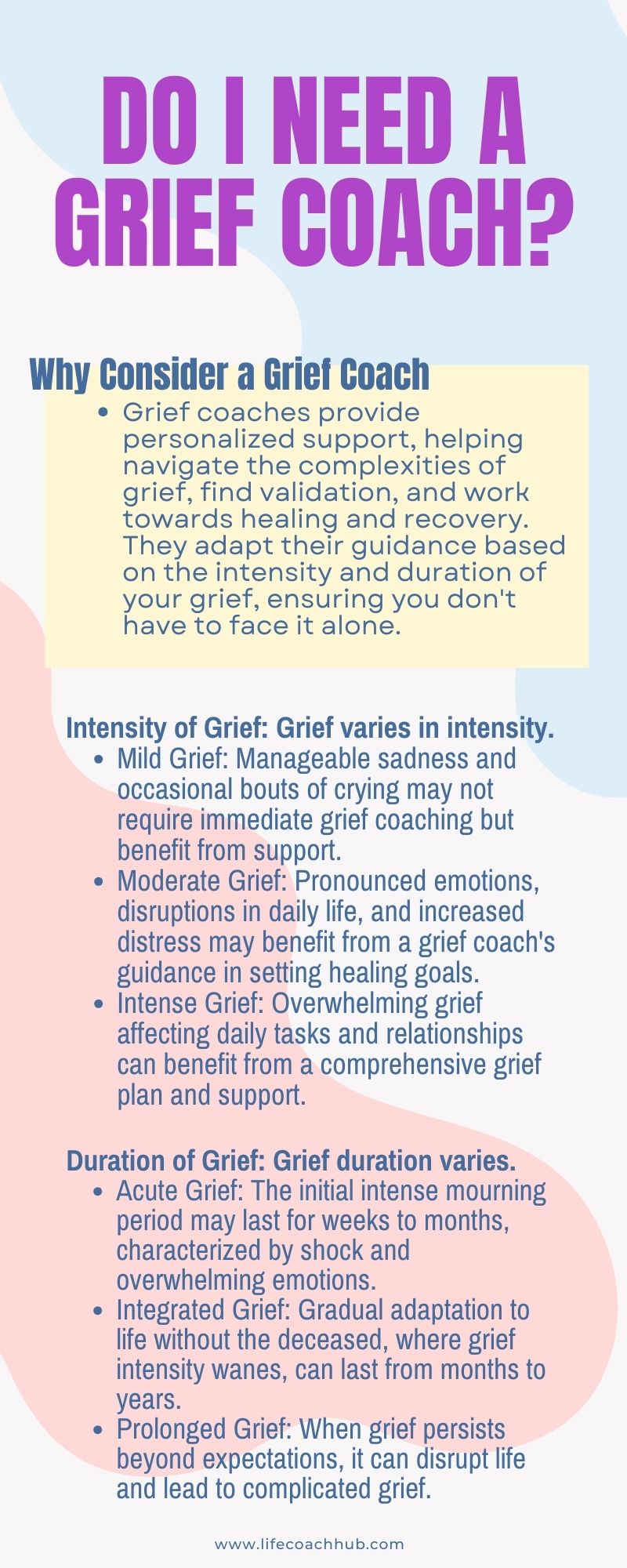
Grief can significantly influence your physical, emotional, and mental well-being. Neglecting self-care can further exacerbate what you're going through. A grief coach can help you recognize the importance of caring for yourself. The both of you can then develop a personalized self-care plan.
Another key point about grief is that it often comes with a complex mix of emotions. Some of which can be difficult to put into words. However, self-expression through art, writing, music, or other creative outlets can release these emotions. Your coach can encourage you to find suitable expressive activities that resonate with you.
Self-care also includes setting boundaries to protect your emotional well-being. A grief coach can assist you in identifying boundaries you need to establish. Whether it's limiting contact with certain people, taking time off work, or creating a quiet space for yourself.
A grief coach can help you understand that it's entirely normal for grief to ebb and flow. Sometimes intensifying and then subsiding. They provide reassurance that there is no right or wrong way to grieve. Your experiences are your own and incomparable.
People often expect to "move on" or "get over it" by a particular time. A grief coach helps you break free of this notion and set realistic expectations. This emphasizes that grief may remain a part of your life in different ways. They encourage patience in the face of unpredictable emotions and reactions.
In addition, self-compassion is crucial during grief. A grief coach encourages you to be patient with yourself. Having "bad days" and setbacks is okay. They help you cultivate self-acceptance and self-kindness.
What are some grief coaching questions I should be prepared for?
During grief coaching, you'll engage in open and supportive conversations with your coach. While the questions can vary depending on your unique situation, here are some common ones you're likely to come across:
Once the tears let up for a bit, you can reach out to one of our professional coaches listed above. Or you can send us a coaching request, and we'll do the matching for you.
